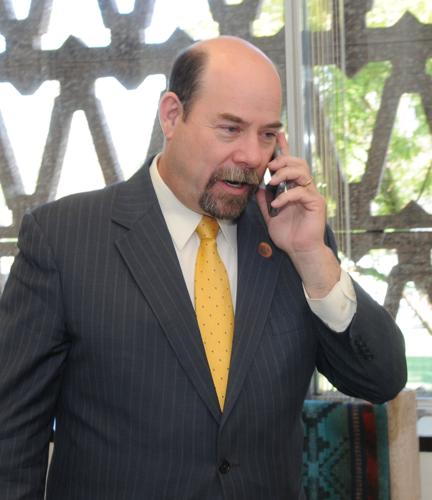Serious problems happened in the 2020 election that Arizona’s Republican legislators are working to solve.
Too many people voted, and they voted for the wrong candidates.
Mom and baby javelina: Wait until you see the little cutie
No, that’s not how the GOP legislators justify the raft of bills they’ve proposed that would make voting harder in Arizona. But when you consider the weak justification for most of them, that’s the conclusion you’re left with.
About 80% of registered Arizona voters cast a ballot in the November general election — historically high — and they voted for two Democrats at the top of the ticket: Joe Biden for president and Mark Kelly for U.S. Senate. Remarkably, Arizona voters also retained the GOP majorities in the state House and Senate.
Now we pay the price for that mixed outcome.
Arizona’s Legislature leads the nation in the number of bills introduced that would restrict voting, with at least 22, the Brennan Center for Justice reports. That’s out of at least 165 restrictive bills introduced in 33 states this year.
It’s part of a backlash against historically high voter turnout, widespread use of mail-in voting due to the pandemic, and former President Donald Trump’s false claims that he was cheated, said Myrna Perez, director of the voting rights and elections program at the Brennan Center.
“The fact that politicians are reacting to historic turnout with restrictions is really disappointing and inappropriate,” Perez said. “It sends a chilling message to communities about how much their vote and their participation is welcome.”
The message is pretty clear when you consider the weak justification of some of the bills. Consider SB 1593, introduced by Sen. David Gowan, the Sierra Vista Republican who represents Legislative District 14.
It would reduce the number of days that early voters have their ballots by requiring recorders to send out the ballots 22 days before the election instead of 27. It would also set a hard deadline of the Thursday before the election by which early voters’ ballots must be postmarked.
Finally, it would allow voters who have not mailed in their early ballots to cast a regular ballot at a polling place, rather than a provisional ballot, if they turn in their mail-in ballot at the same time.
Tuesday night, toward the end of an eight-hour appropriations committee hearing, Alex Gulotta of the organization All Voting is Local, called the bill “a radical bill that makes radical changes.”
“This entire bill is designed so that less people will cast less votes, and of those votes that are cast, even less will be counted. So we’re going to speed up the count by throwing away ballots.”
Gowan, normally an understated presence as chair, took some umbrage at Gulotta’s characterization of his motives.
“I know the intent,” Gowan said. “The intent is to get ourselves to vote faster.”
When asked if he ran these proposals past the state’s county recorders, Gowan said he did — at least one of them.
“I have a favorite county recorder who I tend to work with,” he said coyly.
That recorder, I clarified Friday, is Cochise County’s David Stevens, with whom Gowan worked closely when they were both in the state House. Some of the ideas in the bill Stevens had proposed when he was in the Legislature, he told me.
As to the reduced time for early voting, Stevens said “It gives you less time to lose the ballot.” Too many people lose their ballots, requiring higher costs for printing and mailing additional ballots, he said. Fewer would lose them if they had them less time, he reasoned.
Of course, the Arizona Association of Counties opposes the bill for a variety of reasons, executive director Jen Marson made clear at the Tuesday night hearing. Among the reasons: Not all mail is postmarked, meaning that a ballot mailed on or before the Thursday before the election could still be rejected, because it would not carry the proof that it was mailed before the deadline.
Also, the ability to trade an early ballot for another at the polling place would create a loophole under which voters could potentially cast two ballots, Marson said.
“We also agree that (on) making the voting window shorter — we’re not fans,” she said. “That time frame is not broken, and we don’t feel it needs to be adjusted.”
Of course not, but that could be said of most of the election-related bills. They fix what ain’t broke, unless you consider losing an election a sign of a broken system. Republican legislators have accepted or encouraged the idea, pushed by Trump, that something went wrong with Arizona’s election, when nothing substantial did go wrong. Republican voters responded with complaints, which the legislators used to justify their proposed voting restrictions. It’s a feedback loop.
Gowan also authored SCR 1006, which would have put to voters a proposal to let the Legislature choose the state’s presidential electors. Gowan pulled the bill after receiving pushback suggesting that the bill would let the Legislature overturn the will of the people, and that it would be used against Republicans in the 2022 legislative races.
Among other bills, SB 1358 would prohibit the state’s county recorders from conducting voter registration drives outside government buildings. And SB 1713 would require early voters to file a separate affidavit sheet including driver’s license number along with their ballots.
Randy Perez (no relation to Myrna Perez), the democracy director for Living United For Change Arizona, or LUCHA, said as a whole, the bills seem designed to undermine the work that groups like his have done in turning out Latino and other low-propensity voters.
“This is a clear reaction to the growing power of communities of color across the country, who are turning out and voting in numbers never before seen and threatening traditional structures of power that are built on white supremacy,” he said.
“They’re trying to make the electorate smaller,” he went on. “They’re trying to make it more reflective of their bases and trying to target specific communities that aren’t voting the way they like.”
GOP legislators have denied this claim, of course, saying that they’re trying to fix real electoral problems. But the thin justifications for their bills say otherwise.
They say that the party would rather stick with its Trumpian past and shrink the electorate than change to increase their appeal to voters beyond the GOP’s traditional base.
Photos: 2021 Cologuard Classic golf in Tucson, Day 2
Cologuard Classic, second round
Updated
Mike Weir watches his tee shot from 18 during the second round of the Cologuard Classic golf tournament at the Omni Tucson National Resort north of Tucson, Ariz., on Feb. 27, 2021. (Rick Wiley/Arizona Daily Star)
Cologuard Classic, second round
Updated
Jeff Maggert celebrates after sinking a long putt on 18 to finish 8-under for the day uring the second round of the 2021 Cologuard Classic golf tournament at the Omni Tucson National Resort on Feb. 27, 2021. Rick Wiley/Arizona Daily Star
Cologuard Classic, second round
Updated
David Frost watches his shot of the bunker on 2 roll to a stop during the second round of the 2021 Cologuard Classic golf tournament at the Omni Tucson National Resort on Feb. 27, 2021.
Cologuard Classic, second round
Updated
Davis Love III lofts a towering shot out of the bunker onto the second green during the second round of the 2021 Cologuard Classic golf tournament at the Omni Tucson National Resort on Feb. 27, 2021.
Cologuard Classic, second round
Updated
Bernhard Langer lofts a shot from the third tee during the second round of the 2021 Cologuard Classic golf tournament at the Omni Tucson National Resort on Feb. 27, 2021. Rick Wiley/Arizona Daily Star
Cologuard Classic, second round
Updated
Fred Funk makes a face after chipping onto the second green during the second round of the 2021 Cologuard Classic golf tournament at the Omni Tucson National Resort on Feb. 27, 2021.
Cologuard Classic, second round
Updated
Phil Mickelson sends a chunk of grass skyward while hitting from the middle of the second fairway during the second round of the 2021 Cologuard Classic golf tournament at the Omni Tucson National Resort on Feb. 27, 2021.
Cologuard Classic, second round
Updated
Scott Parel hits out of the rough onto to the green at 9 during the second round of the 2021 Cologuard Classic golf tournament at the Omni Tucson National Resort on Feb. 27, 2021. Rick Wiley/Arizona Daily Star
Cologuard Classic, second round
Updated
Phil Mickelson grimaces after finishing up on the 9th green during the second round of the 2021 Cologuard Classic golf tournament at the Omni Tucson National Resort on Feb. 27, 2021. Rick Wiley/Arizona Daily Star
Cologuard Classic, second round
Updated
Tim Petrovic, who sank a hole-in-one twice during the tournament, hits off the third tee during the second round of the 2021 Cologuard Classic golf tournament at the Omni Tucson National Resort on Feb. 27, 2021. Rick Wiley/Arizona Daily Star
Cologuard Classic, second round
Updated
Jeff Verplank takes a drop under the watchful eye of a rules official on the 18th fairway during the second round of the Cologuard Classic golf tournament at the Omni Tucson National Resort north of Tucson, Ariz., on Feb. 27, 2021. (Rick Wiley/Arizona Daily Star)





